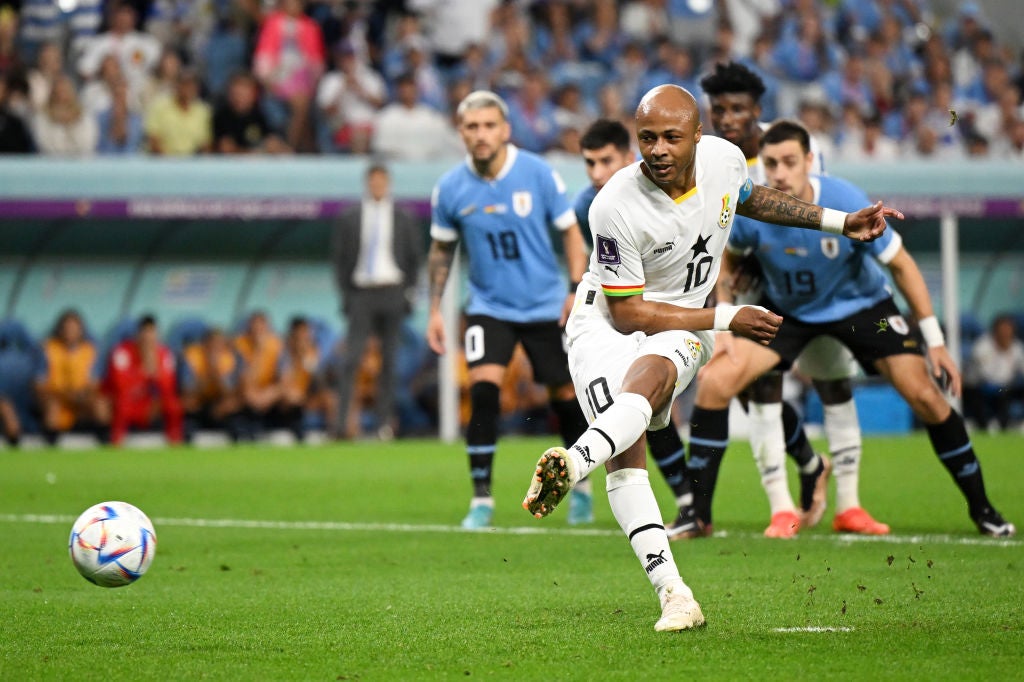Ghana haunted by Uruguay again as World Cup history repeats itself
Andre Ayew had the chance to rewrite Ghana’s painful past against Uruguay - but the moment proved too big to stand
Your support helps us to tell the story
From reproductive rights to climate change to Big Tech, The Independent is on the ground when the story is developing. Whether it's investigating the financials of Elon Musk's pro-Trump PAC or producing our latest documentary, 'The A Word', which shines a light on the American women fighting for reproductive rights, we know how important it is to parse out the facts from the messaging.
At such a critical moment in US history, we need reporters on the ground. Your donation allows us to keep sending journalists to speak to both sides of the story.
The Independent is trusted by Americans across the entire political spectrum. And unlike many other quality news outlets, we choose not to lock Americans out of our reporting and analysis with paywalls. We believe quality journalism should be available to everyone, paid for by those who can afford it.
Your support makes all the difference.On paper, Ghana could not have asked for a better chance against Uruguay.
As Andre Ayew stood over the penalty spot, history was there to be rewritten. It was the moment Ghana dreamed of: the chance, perhaps not to heal the scars of Johannesburg, but to move on and leave them behind. The opportunity to knock Uruguay out of the World Cup was one that was raised when the group stage draw was made months ago, for it to arrive when their own progress was on the line added a sense of ambition to their lust for revenge.
On paper, a penalty, from 12 yards, at 0-0, was as clear an opportunity as you could imagine.
But this was not just any penalty, and this was not just any World Cup fixture. Ghana had not been denied a goal this time, unlike when Luis Suarez punched the ball off the line 12 years ago. Mohammed Kudus was instead taken down by the Uruguay goalkeeper Sergio Rochet when he was running out of pitch, close to the byline. The end result was the same. A Ghanaian stood with the ball, facing a Uruguay goalkeeper.
Ayew was an unused substitute that night in Johannesburg, watching on as Asamoah Gyan clipped the crossbar and the chance to reach a historic World Cup semi-final slipped from their grasp. Suarez would have been yards away. Ayew may even have heard his yelps as he celebrated in glee after his red card went unpunished from 12 yards. The Uruguay striker had been cast as “the devil himself” before this Group H decider - he has haunted Ghana ever since, as much as Gyan’s miss.
On paper, Ayew and Ghana were faced with a penalty. In reality, it was so much more.
And everyone knew it. Ayew did, Ghana did, and Uruguay did. La Celeste, the masters of the dark arts, turned to their tricks. They surrounded the penalty spot. Ghana’s players formed a ring around Ayew, as if to protect him from their negative energy.
He was left, alone, 12 yards out and with Rochet to beat.
The high camera angle at the Al Janoub Stadium even mirrored that at Soccer City. The shot and the framing that has lived in the heads of Ghanaians was here, in front of their eyes.
How many times must Ayew have seen Gyan’s penalty in the time since? Perhaps enough to understand that Gyan’s error was that he was too charged by the moment, his run-up too quick and shot powered by too much emotion. Maybe, then, there was sense in a slower, more considered approach.

But perhaps what was more crucial about Gyan’s miss was knowing how deep a mark it left, that it lived not just in the head of the taker but in the consciousness of a country. Ghana understood that when they were reunited with La Diablo himself.
Ayew’s miss will not leave behind the same trail of hurt. It was soft, saved comfortably by Rochet, but it will not haunt Ghana in the same way, simply because of how early it came, and perhaps by the fact that Uruguay themselves were knocked out, following South Korea’s late winner.
It did not give Ghana another chance and, on paper, they could not have asked for a better one against Uruguay. But then reality came, and history weighed too heavily on the moment for them to stand.



Join our commenting forum
Join thought-provoking conversations, follow other Independent readers and see their replies
0Comments